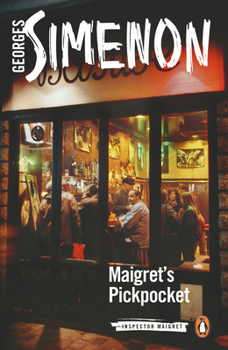Book Overview
"A writer as comfortable with reality as with fiction, with passion as with reason." --John Le Carr When Inspector Maigret's wallet and badge are stolen on a bus, it sets off a chain of events culminating in a grisly murder case A pickpocket steals Maigret's wallet only to contact him the following day, returning the stolen items on the condition that he come to the thief's apartment. When the agitated young thief leads...
Format:Paperback
Language:English
ISBN:0241304172
ISBN13:9780241304174
Release Date:December 2019
Publisher:Penguin Books
Length:192 Pages
Weight:0.35 lbs.
Dimensions:0.5" x 5.0" x 7.7"
Customer Reviews
2 ratings
Maigret feels his age
Published by Thriftbooks.com User , 16 years ago
I picked up three out of print Inspector Maigret stories on a recent trip to New York: Maigret on the Defensive; Maigret's Pickpocket (this volume); and MAIGRET And The KILLER. Translated by Lyn Moir.. Written by Simenon in 1964, 1967, and 1969, respectively, each book takes a look at a Maigret who has aged considerably since his first appearance in 1932. Each book takes us one step closer to Maigret's (and Simenon's) retirement. Each book is a terrific read but there is a certain bittersweet feeling that comes from the realization that Maigret's crime-solving career, like all good things, must someday come to an end. Maigret is feeling his age in this story for two reasons. Maigret, as the title suggests, he has been the victim of a pickpocket. As the story opens Maigret was delighted to find an open-topped double-decker bus (Maigret does not drive a car) to take him work. This enables him to smoke a pipe before arriving at the office and Maigret lets his smoke distract him enough so that he doesn't react quickly enough to being jostled. He then realizes his wallet and badge have been lifted. He is even more surprised when the wallet and badge are returned to him the next day. It seems the pickpocket's wife has been murdered and he has returned the wallet to establish his `honesty' and help Maigret look favorably on his protestations of innocence. Maigret's investigation leads him to a side of Paris he doesn't seem quite able to comprehend, a world filled with new-wave artists and young Bohemians involved in Paris' cinematic community. Maigret's failure to quite grasp the type of lives lived by these `artists' also feeds his sense that time is beginning to pass him by. Nevertheless, Maigret will investigate and seek to solve the mystery. The dialogue between Maigret and the pickpocket As is almost always the case with a Maigret mystery the plot, while entertaining, is not the most compelling aspect of the story. Rather, the entertainment is derived, at least for me, in seeing the world through the eyes by the ever more familiar Inspector. Simenon was a prolific writer but, despite that, did not waste words. Maigret's life and feelings aren't spelled out in the text but are, rather, inferred through Maigret's actions over time. Simenon does not lead you by the nose but presents you with just enough, a casual aside to a colleague, a reaction to a witness, or an observation made to his wife, to give you a feel for the man. Simenon's Maigret stories are always worth reading and "Maigret's Pickpocket" is no exception. Recommended. L. Fleisig
Wine and Punishment
Published by Thriftbooks.com User , 18 years ago
If a brilliant, egotistial young writer were to murder his unfaithful wife in a fit of rage -- how would he cover it up? In a absorbing novel that ripples with crisp action, Magrait enigmatically refuses to lay accusation -- allowing the chief suspect to run unsupervised while he investigates in his usual indirect way, studying the bohemian patrons of an artistic Parisian bar named the "Wine Press." Every character, no matter how minor, is rendered in an utterly convincing way. Siminon uses his narrative to give us glimpses of the different aspect of the creative process he used to write this story -- but he saves the best for last, showing that Maigret's real goal was not to solve the crime, but to understand it. The last page instantly made me realise that Francis could have been Raskaldikoff transplanted from a much longer, yet strangely similar book by Fyodor Dostoyevsky, Crime and Punishment. -- Auralgo






